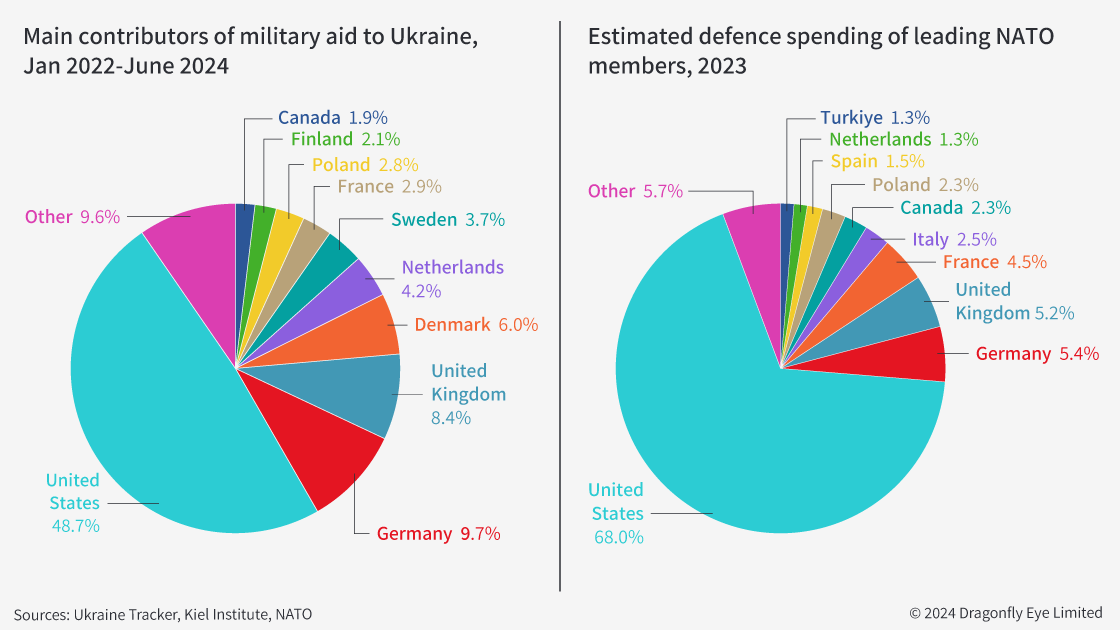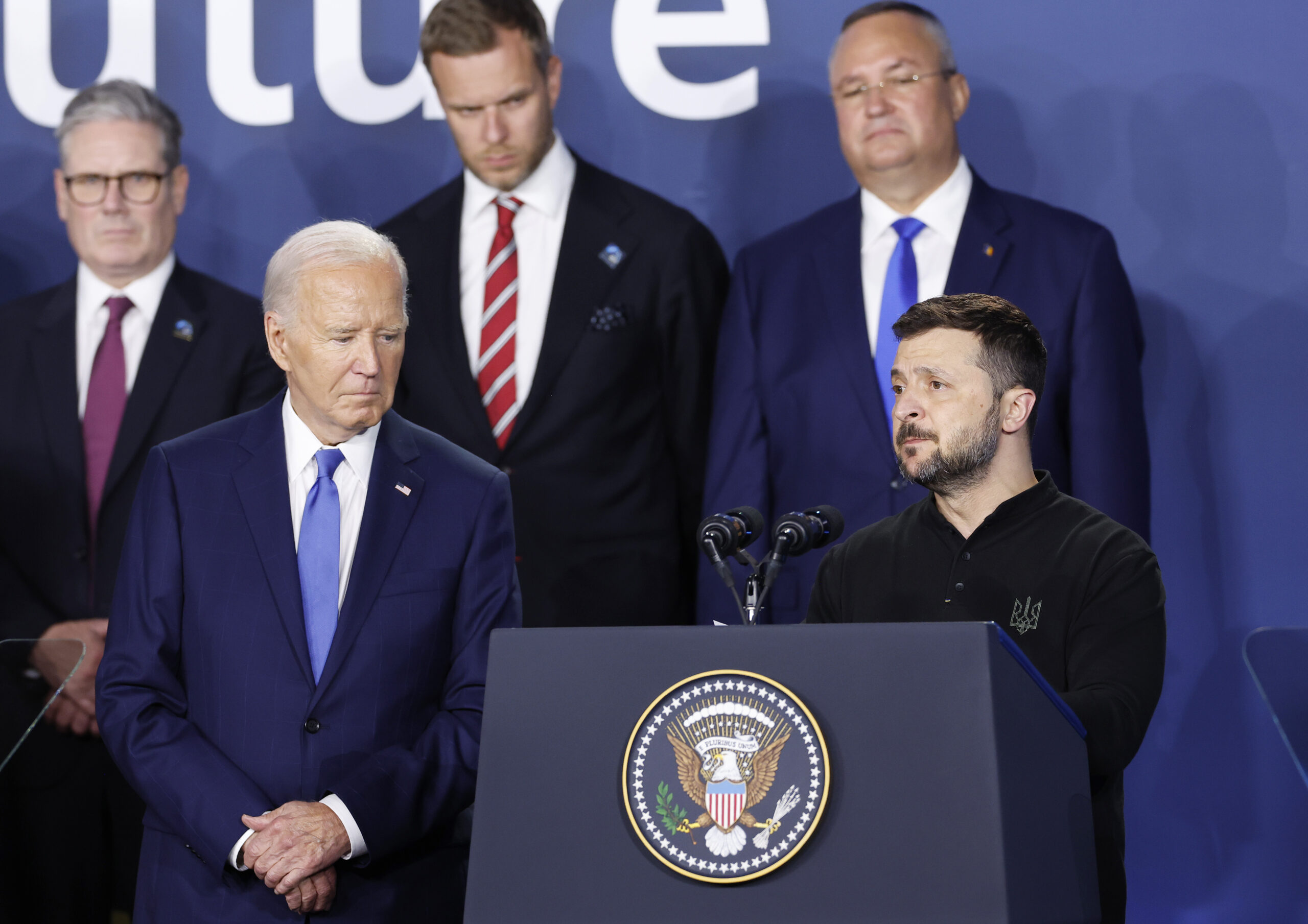The outcome of the US presidential election will strongly affect the trajectory of the Russia-Ukraine war.
This assessment was issued to clients of Dragonfly’s Security Intelligence & Analysis Service (SIAS) on 30 August 2024.
- Russia has expended considerable resources to advance in Donetsk, probably assuming that a Trump administration would let it keep its gains
- A Harris win is likely to prolong the war, but also to speed up the weakening of key institutional ties on which Putin’s rule depends
The outcome of the 2024 US presidential election in November will almost certainly have a significant, and potentially decisive, impact on the trajectory of the Russia-Ukraine war. It looks as though the policies of the two main candidates on military aid for Ukraine and transatlantic security diverge starkly. A victory for former president Donald Trump would probably lead to a reduction in US commitment on both fronts, benefiting Russia. A victory for the US vice-president, Kamala Harris, would probably mean continued US backing for Ukraine, prolonging the war, but potentially weakening Putin’s regime.
US military aid has been crucial for Ukraine’s survival
The US has contributed considerably more military aid to Ukraine than any other country since the onset of Russia’s invasion. By the end of June, US military aid already allocated to Ukraine came to $55.5 billion, according to the Kiel Institute. That is close to half the total delivered by all of Ukraine’s international backers. The military equipment that Washington has provided to Ukraine has helped Kyiv maintain an operational edge against the much larger Russian military. And Javelin portable anti-tank missiles, for example, were vital in the defence of Kyiv early on in the invasion.

Current funding pledges to Ukraine from the US, the G7 and NATO should cover Ukraine’s budget and military needs in 2025. But any weakening of US support would hinder Kyiv’s ability to sustain the fight beyond that. The capacity of European countries to offset a potential reduction in US military funding would probably be constrained, in our assessment. This is not least because of the rising fortunes of political parties in Europe that oppose aiding Ukraine.
The outcome of the 2024 US presidential election in November will therefore be a crucial driver – and hence indicator – for the trajectory of the war over 2025 at least.
Trump would probably shift US foreign policy
A Trump victory would probably favour Russia and deliver a significant blow to Ukraine. Moscow has been conducting a costly, grinding advance in Ukraine’s Donetsk region since late 2023, persisting with this even following Ukraine’s surprise August offensive into the Kursk region of southern Russia. In our analysis, the Kremlin’s perseverance is partly because it expects that Trump will secure reelection and that this could lead to a peace deal in which Russia is allowed to retain the territories it occupies.
That expectation is not without basis. Trump has repeatedly praised Vladimir Putin, usually depicting him as a powerful and canny leader. As early as May 2023, Trump said that were he to lead the US again, he would end the Russia-Ukraine war ‘in 24 hours’, reiterating this on the campaign trail. Although his timescale is implausible, a Trump-aligned US foreign policy institute earlier this year proposed quickly pressuring Ukraine into talks with Russia in a way that would probably freeze the conflict along current lines.
A hastily negotiated peace agreement that allowed Russia to retain occupied territory would have profound implications for Ukraine, international law and security, and Russia itself. It would probably, for example, allow President Putin to present a highly damaging phase in Russia’s modern history as a historic victory against the ‘collective West’. It would give Russia time to rearm and strengthen the emerging alliance of authoritarian powers, led by China, as the main US rival for global leadership.
Yet there are marked differences within Trump’s camp, adding to uncertainty about what his foreign policy might be. In late July, Mike Pompeo, Trump’s former secretary of state and current adviser, co-authored a more Ukraine-friendly ‘Trump peace plan’ for The Wall Street Journal. It proposes, for instance, creating a very substantial lend-lease programme for Ukraine, of up to $500 billion, for purchases of US weapons.
A Harris presidency would signal foreign policy continuity
A Harris presidency would probably continue much of Joe Biden’s foreign policy, including on Ukraine. As vice president, Harris has been closely involved in the US response to Russia’s invasion of Ukraine, most recently attending a Ukrainian-led peace conference in Switzerland in June 2024. And at the Democratic National Convention (DNC) in late August, where she formally accepted the party’s nomination, Harris said ‘As president, I will stand with Ukraine and our NATO allies’.
A Harris presidency would very probably continue to fund Ukraine to prevent its military defeat by Russia, albeit not to the extent that it could achieve decisive military success. Still, this would dash Russia’s expectations for a quick partial victory along the current front lines, even as its manpower and industrial resources are stretched. A Harris victory would probably therefore deal a significant psychological blow to at least parts of the Russian elite, weakening Putin’s regime.
There is no guarantee that the commitment of a Harris administration would translate smoothly into financial backing for Ukraine. Rather, this is likely to depend on the distribution of seats between the parties in the US Congress after November. During a pause in US funding in late 2023, shortages of munitions allowed Russia to advance in Donetsk and devastate large parts of Ukraine’s power sector. It is plausible that such a confrontation between the executive and the legislature could happen again, enabling Russia to achieve similar gains.
Alternative prospects: early talks or US turns inward
Alternative courses remain possible, however. One is that, faced with the renewed prospect of Democratic victory in the US, Russian leaders pursue peace talks with Ukraine before the US election. This is not entirely implausible, but the prospect has probably been superseded by the Kursk offensive, which Russia’s foreign minister said in late August had made talks with Ukraine ‘impossible’. Moreover, the victory in early September of parties of the far-right and populist left in German regional elections will probably encourage Russia’s political leadership to believe its attempts to undermine European political support for Ukraine are working.
A second alternative is that, following a Trump defeat, the US enters a period of internal turmoil. Lengthy legal challenges to election results, or even violent challenges from some Trump supporters, could create a hiatus in US governance, drawing America’s focus away from international affairs. Any prolonged period of US domestic instability would weaken transatlantic unity, at least temporarily, potentially emboldening Russia to try to expand its territorial gains in Ukraine, and testing Europe’s resolve.
Image: U.S. President Joe Biden (L) and Ukraine President Volodymyr Zelenskyy (R) participate in the launching of the Ukraine Compact at the 2024 NATO Summit on 11 July 2024, in Washington, DC, United States. Photo by Kevin Dietsch/Getty Images.




